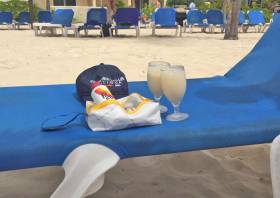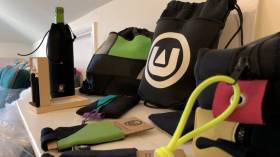Displaying items by tag: Upcycle
Old Dinghy Sails Bag A New Life Thanks To Enterprising Amanda
A new business launched by a well-known sailor on the Water Wags scene uses upcycled sails to create quirky travel washbags.
Prisca Bags is the brainchild of Amanda Chambers, who repurposes old fabric from many different sources into a variety of bags for multiple uses.
One of the latest additions to her range using dinghy and spinnaker sail fabric, turned into “squashable, washable” travel bags.
Making the perfect gift for a spring getaway to a loved one — or yourself! — Prisca Bags are now available from the Dun Laoghaire Pharmacy on Upper George’s Street and other local retailers.
Viking Marine is among those congratulating Amanda, known for sailing the Water Wag Freddie as well as Spirit in the White Sails class, on her new ‘green’ venture.
The chandlery at The Pavilion in Dun Laoghaire is also putting out a shout for old dinghy and spinnaker sails as Amanda is working on upcycled props for the store.
Wexford Designer Breathes New Life Into Old Wetsuits
Old wetsuits aren’t recyclable, with thousands dumped in Irish landfills each year — but as RTÉ News reports, one woman has found a way to ‘upcycle’ them into something new.
Lynn Haughton, a designer based in Co Wexford, has been repurposing the durable neoprene fabric wetsuits are made of into a variety of accessories such as bags and pencil cases.
And what’s more, a tenth of the profits from Haughton’s Neo Collection goes to the aid of local marine wildlife charity Seal Rescue Ireland.
For other recent efforts at upcycling marine-related materials, see the outstanding work of two Cork schoolgirls entering this year’s Junk Kouture contest.
What happens to a wetsuit once it’s thrown away? A Wexford based designer says "they are only waste if you waste their potential”. pic.twitter.com/3Ktqe0F1un
— RTÉ News (@rtenews) January 30, 2019






























































